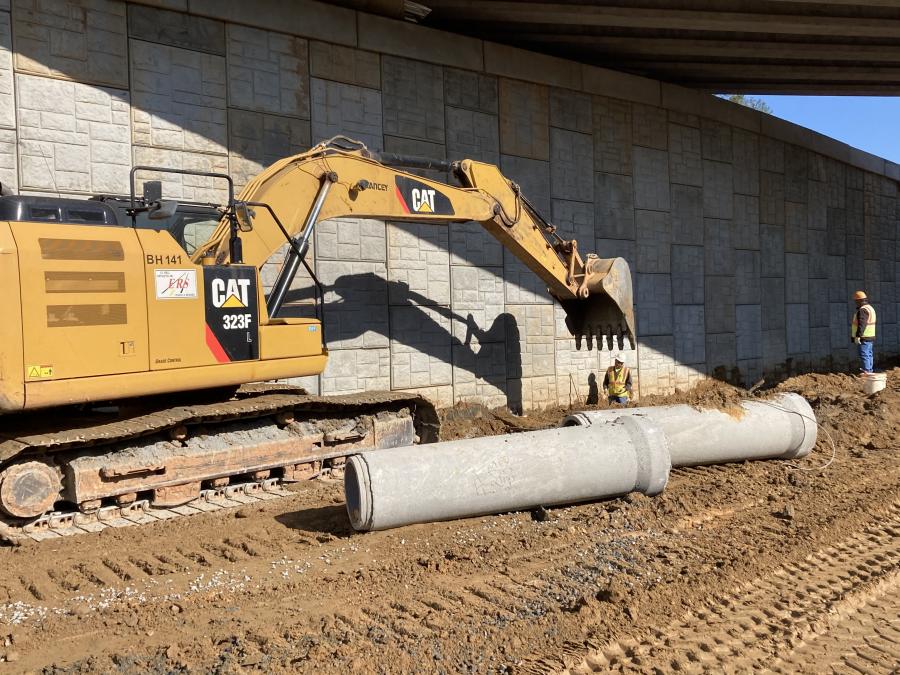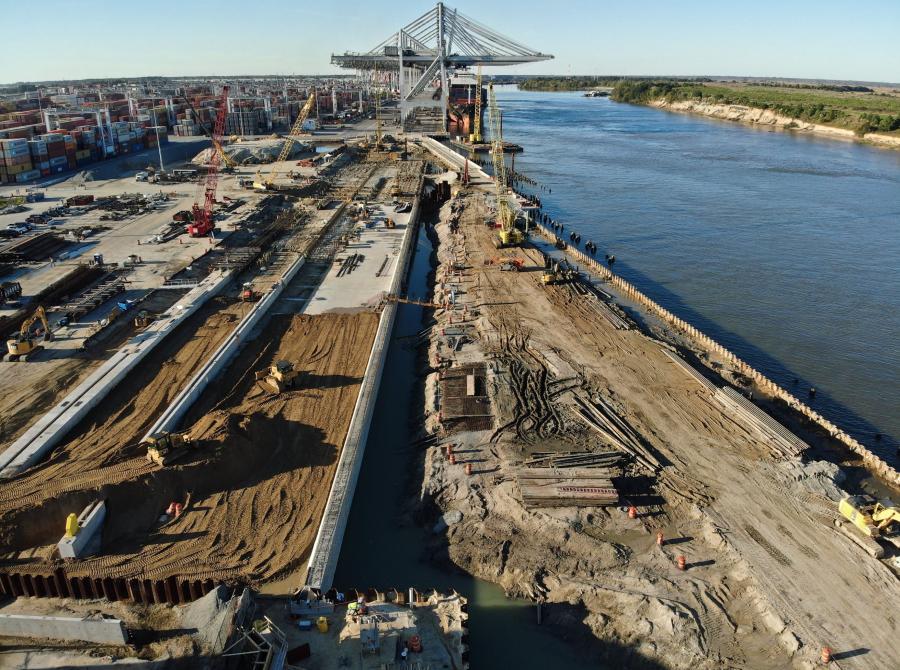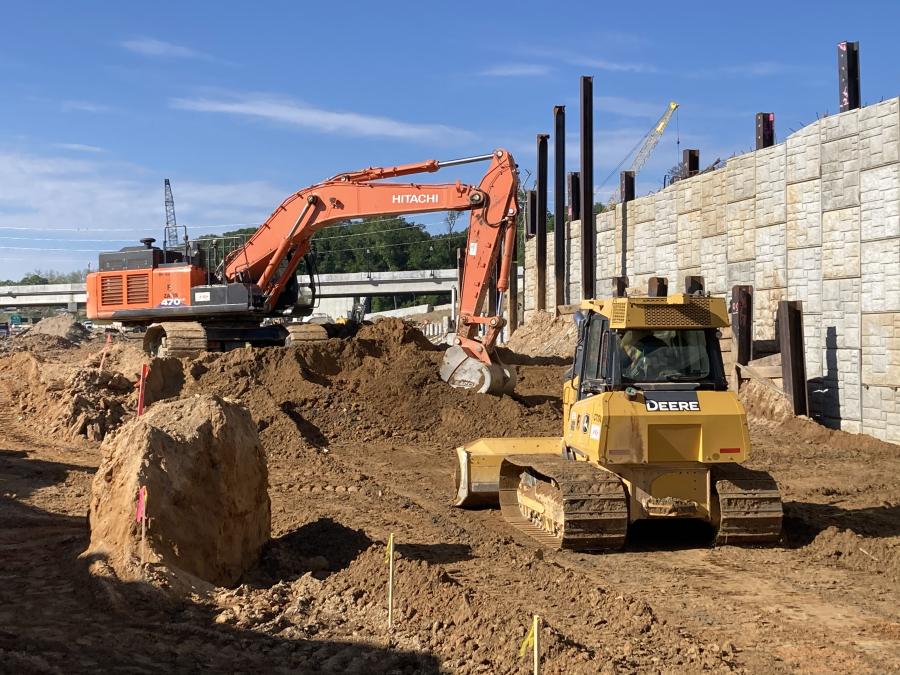Photo courtesy of Georgia Department of Transportation
Georgia is experiencing a construction boom in part due to explosive growth in terms of its population and business investments, which has translated into a massive amount of new construction and earned Georgia the top-ranked state in terms of construction.
It's no secret that the state of Georgia is experiencing explosive growth in terms of its population and business investment, and as a consequence, the Georgia Department of Transportation is in the midst of a comprehensive, multi-billion dollar program to expand the road network to handle the increasing traffic.
This has translated into a massive amount of new construction, be it in commercial hubs in the greater Atlanta area; the expansion and upgrade of the facilities at the Port of Savannah and the state's other ports; and, as noted, the building of new highways, bridges and other infrastructure.
Associated Builders and Contractors recognized Georgia as the number one state for construction in 2023.
"For the first time, Georgia was named the top state for construction in Associated Builders and Contractors' annual Merit Shop Scorecard," stated an ABC press release. "The scorecard, released yearly since 2015, ranks all 50 states and the District of Columbia based on policies and programs that strengthen career pathways in construction, encourage workforce development and advocate for fair and open competition on taxpayer-funded construction projects."

Photo courtesy of Georgia Department of Transportation
The press release pointed out that "Georgia's construction industry continues to prosper, and it earned the top spot due to the state's continued dedication to workforce development. This year, 99 percent of career and technical education students in the state earned a credential and/or continued to a career. Along with inclusive policies that welcome all of the construction industry to compete to build projects in their communities, Georgia's construction employment continues to grow. Georgia claimed third in the 2022 rankings."
In the following Q&A, Bill Anderson, president and CEO of ABC's Georgia chapter, along with Ben Brubeck, ABC's vice president of regulatory, labor and state affairs, elaborated on what is happening in Georgia:
CEG: What is it about Georgia that is spurring on construction and what are the factors allowing the state to get it right, moving from third to first within a year?
Anderson: Many factors have helped Georgia rank as the top state for construction this year. The top four include: Gov. Brian Kemp's strong leadership, the population growth of Metro Atlanta and Georgia, Hartsfield-Jackson Atlanta International Airport and the Savannah port.
The most important factor is Gov. Kemp's strong leadership and focus for more than a decade in ensuring that Georgia is the leading state for business. By confirming that the construction industry was essential during the COVID-19 pandemic, his leadership helped increase momentum since then.
ABC Georgia led the effort to secure more than 30 organizations in real estate, construction and other related industries to sign a letter to Gov. Kemp stressing that construction be deemed essential during the pandemic. His sharp focus on economic development have secured large projects such as the Kia and Rivian plants and others that also increase construction demand.
The ongoing population growth of Metro Atlanta and Georgia is also another critical factor contributing to construction. All new residents who are moving here are creating needs for single family and multifamily developments and other residual projects needed to support this increasing population, such as retail shops, grocery stores and other projects.
Another huge factor helping increase construction in Georgia is that Hartsfield-Jackson Atlanta International Airport continues to be the busiest in the world. More direct and international flights are making others consider Atlanta as their home.
And lastly, the growth of the Savannah port is increasing the growth of warehouses and land/dry ports throughout the state.
CEG: What was the value of new construction in Georgia for 2023 and how would you break it down by sector? Based on the information you have, will Georgia remain among the top five states for the next few years?
Anderson: While the 2023 data for the value of new construction are not yet available, we expect the trend for construction in Georgia will be more robust than other states and likely grow at a faster rate than the national average. This should help ensure that we are among the top five states for construction in the next five years.
The markets of strongest growth for nonresidential construction over the past couple of years include manufacturing, commercial, health care, highway/street and office.
CEG: What are the key factors that are ensuring a steady stream of people will join the construction industry workforce, and can this trend be emulated in other states?
Brubeck: States like Georgia that deploy an all-of-the-above workforce development strategy have been the most successful when battling the challenges of a historic workforce shortage, an evolving construction industry and a unique national economy. Efforts to synergize the workforce pipeline between early career and technical education, pre-apprenticeship and apprenticeship programs, on-the-job craft education opportunities and the stakeholders involved with facilitating and supporting those efforts are vital to a steady and qualified supply of workers in the industry. Equally important is welcoming all contractors, regardless of size, labor affiliation or available resources, to leverage this pipeline through inclusive policies allowing state and local government and private industry to have skin in the game. This has been highly successful.
The industry is unique in that the challenges faced and markers for success from state to state vary so widely. However, states that have focused on proactively innovating and adapting their approach to these challenges have seen fruitful results. Exposing students to the trades at an earlier age and allowing them to see career pathways outside of a conventional four-year college track is key to combating workforce attrition. And allowing contractors to pursue education and training specific to their employees' needs and abilities as opposed to a rigid policy that only values government-registered apprenticeship and/or union-only curriculum has helped develop a highly skilled workforce in the most efficient manner.
CEG: What are some of the inclusive policies that welcome all involved in the construction industry to compete and deliver projects?
Brubeck: The most effective policies are those that welcome all contractors and workers to participate in projects paid for by their own tax dollars. Restricting the use of government-mandated project labor agreements, as Georgia has, should be a priority for any state. Allowing market-driven wages absent a prevailing wage will encourage feasible project costs and timelines. In addition, refraining from extraneous government mandates around apprenticeship or workforce utilization requirements will welcome the full breadth of the industry to be involved.
CEG: What is it about the southern states that are leading the region to be a construction powerhouse?

Photo courtesy of Georgia Department of Transportation
Brubeck: Statehouses in the South have been champions of these inclusive, market-driven and industry-focused policies. This has allowed the construction industry in these states to prosper and contractors to foster a highly skilled and growing workforce.
CEG: What are general contractors and subcontractors doing right in terms of planning to grow their companies to meet the construction demand?
Anderson: Many general contractors and subcontractors are meeting with state and local agencies to determine growth potential, demographics, state incentives and expanding their market sectors with the ability to pivot safely.
They recognize labor is the most important resource and is critical to meet demand. They therefore are focusing on efforts to attract young people to the construction industry, as early as elementary school.
Creating and sustaining the right cash flow is also key and this is achieved by having the right banking and surety partners.
CEG: What are equipment dealerships doing to ensure that general contractors and subcontractors have the equipment they need to get the job done?
Anderson: Many dealerships are committed to hiring more new employees to ensure they keep up with their customer needs. They also are purchasing new equipment to have on hand for when their customers need them. Dealerships also are working to stay connected with the customer cycle to understand what their future needs will be and ensure they are prepared to meet them.
CEG: All this new construction requires a vast amount of materials, including concrete, asphalt, piping, wood, steel, rebar, glazing and other key elements of construction. How are suppliers in Georgia and the South keeping up with the demand by the construction industry?
Brubeck: Although they have leveled out post-pandemic, materials prices and availability continue to be a national and international problem. Business leaders must keep their eyes on trends and ensure they are planning schedules accordingly. Successful Georgia business leaders have great working relationships with their elected leaders, which helps ensure that shortages or issues in the supply chain having to do with regulation can be quickly and efficiently addressed.
Many contractors are paying deposits to lock in prices and ensure they have access to raw materials. A lot of their owners are supportive of this strategy because it helps with their progress payments, and a purchase order for materials doesn't have retainage held on it. So, while they may pay in advance for stored raw materials, this helps to ensure they will not run out of materials, which would be much more costly, especially if it delays projects. CEG
Irwin Rapoport
A journalist who started his career at a weekly community newspaper, Irwin Rapoport has written about construction and architecture for more than 15 years, as well as a variety of other subjects, such as recycling, environmental issues, business supply chains, property development, pulp and paper, agriculture, solar power and energy, and education. Getting the story right and illustrating the hard work and professionalism that goes into completing road, bridge, and building projects is important to him. A key element of his construction articles is to provide readers with an opportunity to see how general contractors and departments of transportation complete their projects and address challenges so that lessons learned can be shared with a wider audience.
Rapoport has a BA in History and a Minor in Political Science from Concordia University. His hobbies include hiking, birding, cycling, reading, going to concerts and plays, hanging out with friends and family, and architecture. He is keen to one day write an MA thesis on military and economic planning by the Great Powers prior to the start of the First World War.
Read more from Irwin Rapoport here.
Today's top stories
















